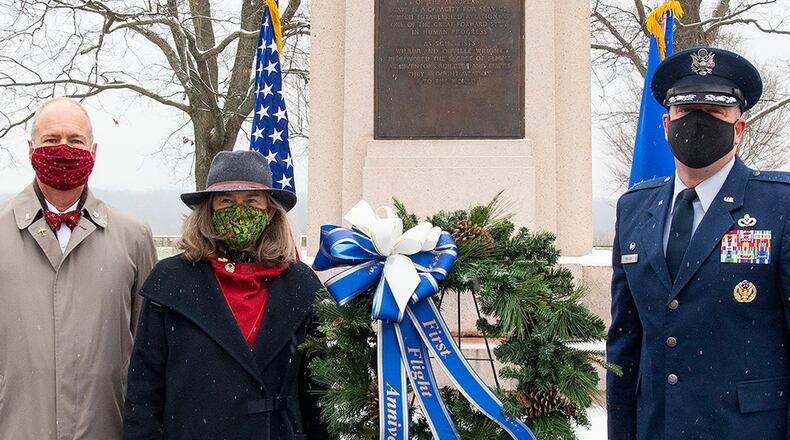In his opening remarks, Miller announced a special aspect of the ceremony: that video professionals had enabled it to be a dual broadcast with celebrants in Kitty Hawk, North Carolina. The ceremony can be viewed at www.dvidshub.net/video/777464/117th-anniversary-powered-flight-full-ceremony.
“This is one of the first times we have been able to link both sites up together,” Miller said, “to recognize this tremendous moment in history.
“Wright-Patterson Air Force Base has been a proud caretaker of this memorial and Huffman Prairie Flying Field since 1978. It has been a great partnership with the National Park Service and the Wright family as we continue to recognize the significant event – this milestone event – of first (powered, controlled) flight. The evolution of the aircraft has come a long way.”
The event’s keynote speaker was Brig. Gen. John Newberry, program executive officer for bombers in the Air Force Life Cycle Management Center’s Bombers Directorate. He applauded the Wright brothers’ imagination and enthusiasm as they “inspired so many to take to the skies.”
“The spark of innovation 117 years ago led to the greatest and most capable U.S. Air Force today,” Newberry said.
He outlined how the Wright brothers, following their return from Kitty Hawk, used Huffman Prairie as a testing ground to refine the principles of controlled, powered flight. Among their first flight school students was 1st Lt. Henry “Hap” Arnold, who rose through the ranks to eventually become a five-star general and “father” of the Air Force.
“He was a ‘bomber man,’” Newberry said, “advocating for the development of bombers such as the B-17. He paved the way for aircraft we fly today and the aircraft we envision for tomorrow.
“The Wright brothers’ passion for flying and their school inspired so many to climb into the air. The Wright brothers also laid a foundation for technology-advanced aircraft and spacecraft we use today.”
Newberry noted that U.S. Space Force’s first anniversary was Dec. 20.
“Our advancement in the air over the last 117 years has been unstoppable and eventually enabled us to explore and occupy space,” he added.
“The Wright brothers’ early aircraft designs influenced future aircraft. The B-1B Lancer shares foundational designs with the Wright Flyer in terms of changing wing shape for different flight results. The swept wing was a key concept by the Wrights as the aircraft used warped wings to change their shape for lateral and roll control on fixed-wing aircraft.”
The Wrights’ use of forward-mounted elevators also is a concept found on the B-1B, he said, and forward-controlled surfaces on the commercial SpaceX Starship SN8 re-entry vehicle being tested.
“The men and women in the Air Force are proud and honored to carry on the Wright brothers’ spirit of innovation. We celebrate today the 117th anniversary with an eye to the future of continued innovation and exploration into air and space sparked by the spirit of invention from the Wright brothers,” he concluded.
Kendell Thomson, Dayton Aviation Heritage National Historical Park superintendent, presented a presidential proclamation prior to the wreath-laying ceremony with members of the Wright family.
Miller, Amanda Wright Lane and Stephen Wright placed a wreath in front of the memorial’s obelisk, which was dedicated in 1940 with Orville Wright in attendance.
A flyover of a Rockwell B-1B Lancer hailing from 28th Bomb Wing at Ellsworth AFB, South Dakota, concluded the celebration.
Afterward, Wright Lane said attending the event is “in our DNA. We came here as young people with our elders. It’s so interesting because every year there are different things to celebrate in terms of aviation. I was so pleased today General Newberry spoke about Space Force and how that is a new part of the U.S. arsenal.”
“Whenever we have this ceremony every year, I wonder about our great-grand uncles and what they would think when they see the magnificent airplanes fly over and realize how far we have come,” Stephen Wright said. “At one point, Wilbur was interviewed by a reporter, and at that point he couldn’t imagine an airplane carrying more than five people. So you can imagine what he would be thinking today, to see that B-1B fly over us. It’s just amazing.
“We’re so fortunate to have an Air Force that still considers where it came from and wants to honor that.”
Added Wright Lane: “We so appreciate the Air Force continuing to honor them this way, not just to this region but, of course, to the world. It’s wonderful to celebrate.”
About the Author


